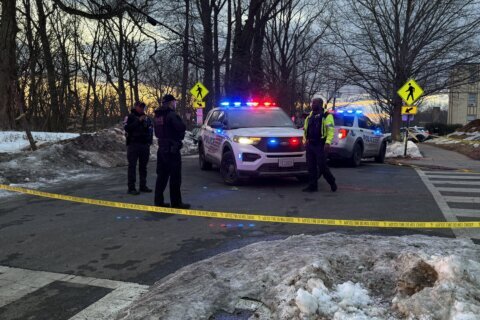The D.C. Council’s Office of Racial Equity issued a report tackling the challenges that Black and brown communities are encountering as they try to get a COVID-19 vaccine.
The report also provides a series of new suggestions to improve access, distribution and address policy barriers.
The office, also known as CORE for short, pinpoints several factors and barriers in the 12-page report that are driving down vaccination rates.
They include limited vaccine supply, an appointment registration system that’s struggling lately to stay online, proper access to vaccination sites and independent pharmacies that are currently not allowed to receive doses directly from the federal government.
“It is literally a matter of life and death,” CORE Director Brian McClure told WTOP.
In its report, CORE listed a series of statistical data that show the current racial disparities when it comes to who’s getting a vaccine.
One table shows 19% of Black residents in D.C. report receiving their first dose as of Feb. 20, compared to almost 30% of white residents in the District.
The numbers are even more striking based on more specific ethnicity and geography.
Another table shows that just 3% of Hispanic residents reported receiving their first dose as of Feb. 20. That comes out to just a little fewer than 2,000 people.
The report also breaks down the data down by region. Ward 8, which is predominantly Black, had one of the lowest rates of all.
The table shows less than 5% of people ages 65 and older received their first shot in Ward 8. Rounding out the bottom three are Ward 7 at 6% and Ward 5 at 11%.
“When we look at the percentage of the populations in Wards 5, 7 and 8 that’ve been vaccinated compared to other wards, it’s very troubling,” McClure said. “We hope this framework will begin to reverse some of those trends.”
The CORE framework stresses a centered response with racial equity at the forefront, community infrastructure investment, along with shielding and elevating community voices and power.
“A racially equitable COVID-19 response requires rethinking traditional approaches to solving social and economic problems,” reads the report. “An equitable framework begins with collaborative strategic planning.”
The study goes on to say that the planning must involve both the executive and legislative branches, amplify voices of community stakeholders and involve the District’s most marginalized communities.
CORE also shows how other states are doing a better job. It points out how Maryland is using and expanding the role of the Medical Reserve Corps to help administer doses and created several mass vaccination sites.
“Every aspect of our public health and economic response to this pandemic must be done through the lens of racial equity,” Ward 5 Council member Kenyan McDuffie said in a news release.
McDuffie requested the review and framework from CORE.
“Black communities have been the hardest hit by this virus but are getting vaccinated at the lowest rate,” McDuffie said. “This new framework provides useful suggestions to help guide our actions.”
- Sign up for WTOP alerts
- Latest coronavirus test results in DC, Maryland and Virginia
- Coronavirus vaccine FAQ: What you need to know
- Latest vaccination numbers in DC, Maryland and Virginia
- Preparing for next vaccine phase, Montgomery Co. urges more sign-ups to boost equity
- New COVID-19 report paints bleak picture for DC-area kids, households
Looking for more information? D.C., Maryland and Virginia are each releasing more data every day. Visit their official sites here: Virginia | Maryland | D.C.








